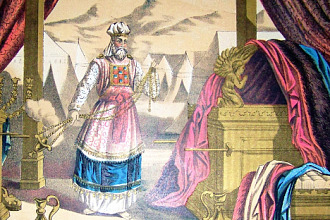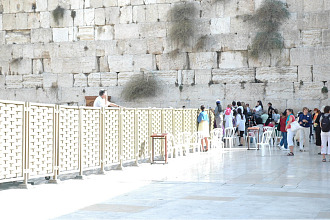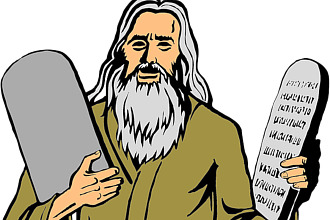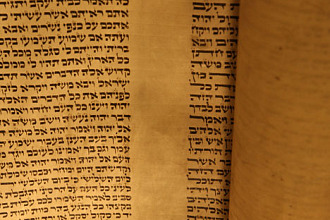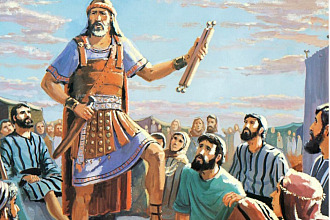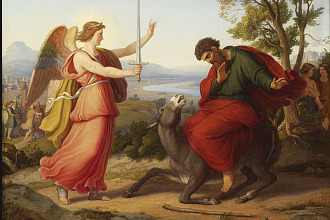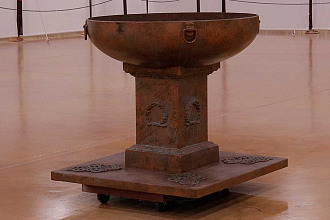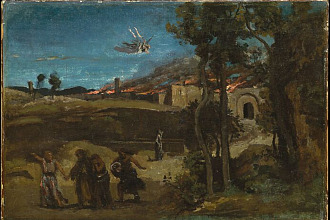Parasha for the Week: Bechukotai: Leviticus 26:3 – 27:34
Haftarah: Jeremiah 16:19 – 17:14
Besorat Yeshua: Mark 3:13 – 30
Overview:
The Torah promises prosperity for God's People if they follow G-d's commandments. However, if they choose not to follow God's plan disaster is the natural result.
The sad historical process that will fall upon us if we move outside of God's Divine protection.
Sefer Vayikra, the book of Leviticus, concludes with the details of erachin (gifts to the temple) – the process by which someone vows to give the Beit Hamikdash the equivalent monetary value of a person, an animal or property (valuation and redemption of animals, houses, fields) ... and lastly, the second tithe and tithing animals. And thus ends the Book of Leviticus.
"Peace in the Land"
The Torah states, "And I will place peace in the land" (Lev. 26:6).
"Helping Others to be Faithful"
Mr. Cohen loaned Mr. Green a large sum of money. Mr. Shapiro agreed to guarantee the loan; he would pay Mr. Cohen if Mr. Green will be unable to pay. If Mr. Green were investing his money in a business that was sure to lose money, Mr. Shapiro would definitely do everything in his power to prevent Mr. Green from becoming involved in that business. Mr. Shapiro knows that if Mr. Green wastes his money, the obligation to repay the loan will be his.
"The same applies to preventing others from transgressing," said the Chofetz Chaim. "If someone has the ability to stop another person from transgressing and fails to do so, he is held liable for that offense. Therefore, we must do everything we can to help our brethren and sisters to be faithful to G-d."
"Consequences of our Actions"
The Torah tells us: "And if you shall reject My statutes..." (Leviticus 26:15) It is interesting than in many synagogues this portion is read in a low voice and often very fast. The Chofetz Chaim, gave again an analogy of someone who had to travel on a dangerous path. It was on a very high and extremely narrow mountain and he could easily trip and harm himself. So, he decided he would wear a blindfold because it was too scary to watch! Anyone with intelligence will realize that the person is in greater danger being unaware of the true situation. Likewise, regarding not behaving properly. By realizing the consequences of transgressions and failing to do good, we will watch our behavior more closely and will gain immensely.
"To be Holy at Home"
The Torah states regarding a person who wishes to give the value of his house to the Temple: "A person who sanctifies his house, the Cohen shall evaluate it..." (Leviticus 27:14). The Kotzker Rebbe comments that when a person is involved in spiritual matters, it is relatively easy for him to do so in a sanctified setting. However, true holiness is when a person sanctifies the seemingly mundane activities in his household. When one behaves in an elevated manner in his own home, he is truly a holy person. Torah ideals and principles are not only for when one is in a theological school or spiritual assembly; they are for all areas of our lives. With strangers or in a public setting it is often easier to be patient or behave properly. Therefore, one should focus that his first priority should be treating the family properly. The more sanctified your behavior at home, the greater you become!
"Promised Blessing"
The Torah states: "If you will walk in My ordinances and observe My commandments and perform them. Then I will provide your rains in their time, and the land will give its produce and the tree of the field will give its fruit" (Leviticus 26:3-4)
In the parasha there are 7 series of 7 punishments each (49). Concerning forgiveness Yeshua said "I tell you, not seven times, but seventy-seven times" (490) forgiveness has to be 10x more.
"Humility"
After the Nazis invaded the small village of Klausenberg, they began to celebrate in their usual sadistic fashion. They gathered the Jews into a circle in the center of town, and then paraded their Rebbe, Rabbi Yekusial Yehuda Halberstam, into the center. They began taunting and teasing him, pulling his beard and pushing him around. The vile soldiers trained their guns on him as the commander began to speak. "Tell us Rabbi," sneered the officer, "do you really believe that you are the Chosen People?" The soldiers guarding the crowd howled in laughter. But the Rebbe did not. In a serene voice, he answered loud and clear, "Most certainly." The officer became enraged. He lifted his rifle above his head and sent it crashing on the head of the Rebbe. The Rebbe fell to the ground. There was rage in the officer's voice. "Do you still think you are the Chosen People?" he yelled. Once again, the Rebbe nodded his head and said, "yes, we are." The officer became infuriated. He kicked the rebbe in the shin and repeated. "You stupid Jew, you lie here on the ground, beaten and humiliated. What makes you think that you are the Chosen People?" From the depths of humiliation clouded in dust, the Rebbe replied. "As long as we are not the ones kicking and beating innocent people, we can call ourselves chosen."
"To Accomplish God's Mission"
Rabbi Elimelech's neighbor's name was also Elimelech. He was a furrier, who worked very hard in order to make ends meet to support his family. One night, the man was very tired and fell asleep during his work. Through the thin wall which divided their homes, Rabbi Elimelech, one night, heard the furrier's wife waking her husband, saying, "Elimelech, wake up! Fix the fur coat while the candle is still burning!" Rabbi Elimelech said, "Those words stuck in my mind. They remind me continuously, that as long as my candle is still burning, I'm alive; I have to keep on fixing. I have to keep on working to accomplish G-d's mission in this world.
Haftarah: Jeremiah 16:19 – 17:14
Haftara: Jeremiah lived in a time of trouble. Jerusalem was about to be taken by the Babylonians, and he was himself misunderstood by the people of Israel and her leadership, but his confidence and strength were in the L-rd, that's why he says, "O L-RD, my strength and my stronghold, my refuge in the day of trouble'" (Jer. 19:19).
Jeremiah encourages everyone who stays faithful to the L-rd, even though they are in a time of trouble. He says, "Blessed are those who trust in the L-RD, whose trust is the L-RD. They shall be like a tree planted by water, sending out its roots by the stream. It shall not fear when heat comes, and its leaves shall stay green; in the year of drought it is not anxious, and it does not cease to bear fruit" (Jer. 17:7-8).
But at the same time he reminds the unfaithful that they will receive the consequences of their actions. "whose hearts turn away from the L-RD. They shall be like a shrub in the desert, and shall not see when relief comes. They shall live in the parched places of the wilderness, in an uninhabited salt land." (Jer. 17:5b-6).
The L-rd is a faithful G-d who continues to give choices. Everyone has the possibility of following him and bearing fruit. "I the L-RD test the mind and search the heart, to give to all according to their ways, according to the fruit of their doings" (Jer. 17:10).
The structure of this text is in A-B-C - C'B'-A' that means it is an alternate focus on righteous and weak and comes back in reverse. Thus Jeremiah praises the L-rd again for his righteousness "O glorious throne, exalted from the beginning, shrine of our sanctuary! O hope of Israel! O LORD!" (Jer. 17:12). Then he comes back to the weak to tell them that running away from the source of life is not the best choice they can make. He is the sustainer of the universe. "All who forsake you shall be put to shame; those who turn away from you shall be recorded in the underworld" (Jer. 17:13). The text finishes with a positive statement and praise. "Heal me, O LORD, and I shall be healed; save me, and I shall be saved; for you are my praise." (Jer. 17:14)
Besorat Yeshua: Mark 3:13 – 30
Parasha: Our final text of Leviticus reminds us of the blessings of following G-d and his commandments and the consequences of running away from the L-rd. "If you follow my statutes and keep my commandments and observe them faithfully, I will give you your rains in their season, and the land shall yield its produce, and the trees of the field shall yield their fruit" (Leviticus 26:3-4).
Besorah: In the text of the Besorah Yeshua continues his ministry, choosing his first talmidim and teaching the people who come to him. "He went up the mountain and called to him those whom he wanted, and they came to him. And he appointed twelve, whom he also named apostles, to be with him, and to be sent out to proclaim the message, and to have authority to cast out demons" (Mark 3:-13-15). Here are the Jewish names of the talmidim of Yeshua: Shim'on, to whom he gave another name, "Kefa"; Ya'akov Ben-zavdai and Yochanan, Ya'akov's brother — to them he gave the name "B'nei-regesh" (that is, "Thunderers"); Andrew, Philip, Bar-talmai, Mattatyahu, T'oma, Ya'akov Ben-halfai, Taddai, Shim'on the Zealot, and Yehudah from Kriyot" (Mark 3:16-19).
The reaction presented in this text conforms to the text of the parasha. Some accepted Y'shua, some were more reluctant, but everyone has to make his choice. The crowd were amazed at him "and once more, such a crowd came together that they couldn't even eat" (Mark 3:20). They were so captivated by his teaching that they did not want to leave him even for eating. Yet at the same time that great multitudes were accepting and following Him others were rejecting Him and trying to find fault with Him.




